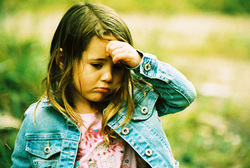How does Domestic Violence Affect Children?

When children live in a home that has domestic violence they are experiencing trauma. It does not matter if the child experiences the DV firsthand or witnesses the DV happening to another family member. A child that lives in a home with any form of DV is affected in a negative manner.
When stress is experienced there is an increase in cortisol within our body. This is true for adults and children. When DV occurs repeatedly toxic stress is experienced. When toxic stress occurs we areessentially bathing our brain in cortisol. This also occurs to a child while they are in the mother's womb. If a mother experiences high levels of stress their cortisol passes the placental barrier and the child is affected. This increase in cortisol causes physical, emotional, psychological, social and behavioral changes within a child.
Studies have shown that children that experience repeated trauma/toxic stress show a smaller than average brain size compared to peers that have not experienced this repeated trauma. Cognitive function is impaired and children experience difficultly with tasks that require memory. There is a noticeable decline in attention span and ability to focus. It is difficult for these children to regulate themselves or self-soothe. These children are "on edge" and experience a heightened startle response.
Children that are living in a DV environment experience higher amounts of fear in regard to their environment. Their basic sense of safety and trust is undermined by the out of control feeling they experience within the home environment. They too, experience helplessness and depression. Children internalize blame and blame themselves for the DV that occurs in the home. They feel that it is something that they did or did not do that caused the DV. They can experience problems sleeping, act out aggressively or regress in their behaviors.
Children are not able to function at school and may not want to go to school. At times, they may feel that if they are with the abused parent they can in someway prevent the abuse. If children do go to school they are not able to concentrate and learn due to fears of what is happening at home. Children may be labeled as ADHD due to inability to concentrate, behavioral issues at school and issues socially with other children.
The affects of DV last a life time and set the child up to repeat the DV cycle with their own children. If our children form a negative attachment to us then they will not be prepared to attach to their children in a positive manner. DV sets up generations to be affected in negative and damaging ways.
It is important that if you experienced DV within your childhood that you work through your trauma. We can only parent how we learned to parent. If our parents were unable to attach to us in a healthy manner, we will be unable to attach to our children in a healthy manner. It is important to recognize the unhealthy pattern and break the cycle. Counseling can help you learn how to strengthen the attachment you have with your child and build a secure bond that can affect future generations of your family in a healthy way.
If you are in a DV relationship seek help to find support to make sure that you can get out of the relationship safely.
Walnut Women's Center 24 Hour help line
866-269-2559
Defense de Mujeres
888-900-4232
Women's Crisis Support 685-3737
Provides emergency shelter for DV and sexual assault victims
DV Hotline
800-799-SAFE

